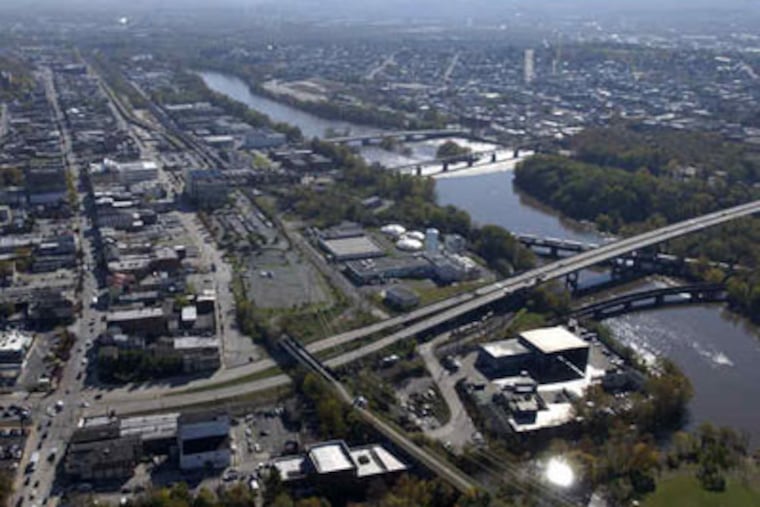Developer sells property but doesn’t lose faith in Norristown rebound
Not long ago, Brian O'Neill sparked big hopes for redevelopment.

Developer Brian O'Neill's promise to lead an ambitious revitalization of Norristown's depressed Schuylkill riverfront came to an official end yesterday with an agreement to sell his only property there to the Montgomery County Redevelopment Authority.
O'Neill said not to count out a Norristown revival, or his role in it.
"It is the next great river town to be redeveloped," O'Neill predicted in an interview later in the day - something he has said often of the county seat in recent years. "I hope I'm a huge player."
But for now, he is exiting the waterfront, where not long ago he sparked big hopes. Using dazzling color sketches and his trademark effusive salesmanship, O'Neill hooked a troubled town on the idea of luxury condos, cafes, shops, a multiplex, even a minor-league ballpark sprouting from a 365-acre redevelopment zone.
That area included 60 acres along the Schuylkill and Norristown's commercial corridor, Main Street.
O'Neill, who heads O'Neill Properties Group L.P. of King of Prussia, was designated the preferred redeveloper in November 2000 by the Redevelopment Authority and the borough, which would have put him first in line for public funding for the revitalization.
Instead, public funds are being used to buy out his riverside holdings.
In the deal approved yesterday by the authority's executive board, $3.7 million in state economic-development and infrastructure-improvement funds approved for O'Neill's use will go to buy nearly 13 acres he bought between 1988 and 2003 for $930,500, according to county property records.
The land, at 500, 600, and 700 E. Washington St., includes the former Nicolet asbestos-manufacturing plant. O'Neill had secured state funding for demolition and property cleanup, but he had never amassed the private money necessary to proceed with any significant work there, said Jerry Nugent, the Redevelopment Authority's executive director.
The plan now is to use the properties for a new sewage-treatment plant, the details and financing of which are still being worked out. The plant would replace a malfunctioning facility nearby, long considered an obstacle to riverfront redevelopment.
Future revitalization efforts would be focused on the riverfront west of the new plant, estimated to cost $150 million and be at least eight years from completion.
"This is an enormous project of great importance," Jay Ochroch, Redevelopment Authority vice chairman, said at yesterday's meeting.
Dave Forrest, Norristown's borough manager since 2007, echoed that sentiment in an interview, while indicating that many more steps still need to be taken.
"We need to keep moving," Forrest said.
O'Neill was not present for the five-minute vote, the culmination of a deal Redevelopment Authority officials said had been in the works since October and was not likely to translate into meaningful revitalization for at least 10 years.
Said an undeterred Paul Bartle, the authority's chairman: "Anything worthwhile takes time."
In an interview, O'Neill said he agreed to sell because "I want to help" Norristown resolve hindrances to its revitalization. He identified those as the sewage-treatment plant, in part nearly 70 years old, and the lack of a direct connection from downtown to the Pennsylvania Turnpike.
The latter is considered by many to be the most critical component of a Norristown rebirth, just as completion of the Blue Route was to the transformation of Conshohocken and West Conshohocken. Work on the $140 million interchange is expected to begin in 2013 and conclude in 2016, said Steve Nelson, policy director for Montgomery County and a proponent of the project.
"Brian is full of vision and energy, but you've got to have that actual physical improvement for anything to happen," Nelson said.
Also working against Norristown's revival has been its long history of embarrassing legal problems, including former Mayor Ted LeBlanc's conviction in April 2006 on bribery, bank fraud, and tax-evasion charges.
A month later, former borough manager Anthony Biondi, who resigned in 2004 under the shadow of a federal investigation, pleaded guilty to municipal corruption and tax evasion.
"Those kinds of things set us back," O'Neill said.
But he also was slowed because assembling properties in the redevelopment zone became difficult. Emboldened by the grand vision O'Neill had for Norristown, owners of land he wanted held out for more money.
"I think he oversold his vision and people saw dollar signs," said Nugent. "Some of the owners down there still have stars in their eyes because of Brian's big pitch."
By his count, O'Neill still owns nine properties throughout downtown Norristown. Yesterday, he said he plans to buy riverfront property, but would not say when.
In the meantime, the recession has caused problems completing O'Neill's priority project in the region, the mixed-use Uptown Worthington complex along Route 202 in East Whiteland Township.
In November, Citizens Bank of Pennsylvania, the primary lender on Worthington, secured a $61 million judgment against O'Neill in Montgomery County Court for defaulting on an office-construction loan. The bank followed up with two judgments, in December and January, totaling $3 million in connection with the unfinished Horizon Corporate Center, a 101-acre office/retail/restaurant complex in Bensalem.
In January, O'Neill struck back, filing an $8 billion suit against Citizens Bank and its parent company, claiming they had breached their financial commitments to him.